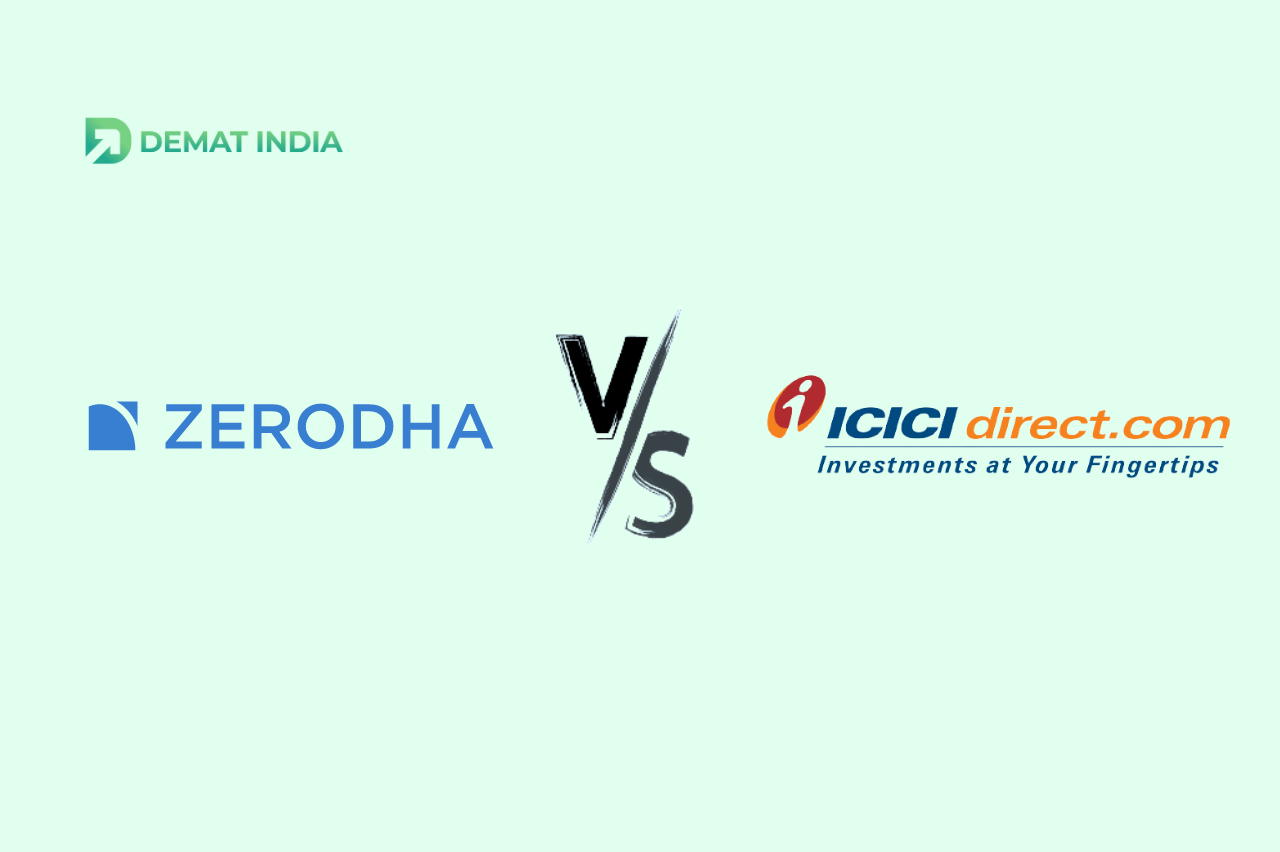

Zerodha Vs ICICIDirect
Founded by Nikhil Kamath and Nitin Kamath, Zerodha is the fastest growing discount broker in India. Started in 2010, with customer centric approach, soon Zerodha became market leader in the industry and currently serving 65+ lakhs active clients. Being the No.1 stock broker, Zerodha is technologically the most advanced stock broker in India. Zerodha is a discount broking firm that provides the facility to invest in equity, currency, direct mutual fund, commodity, IPO, future and options. The brokerage charges of Zerodha for equity delivery and direct mutual funds are zero. For intraday trading, the brokerage charge is Rs. 20 or 0.03% (whichever is lower) irrespective of transaction size. The account opening charge with Zerodha is Rs. 300 and the same amount for annual maintenance charge. For investment in equity and mutual funds, Zerodha has developed two different applications, Kite for investment and intraday trading and Coin for mutual funds investment.
ICICIDirect
Established in 1995, ICICIDirect is one of largest full-service stock brokers in India. It is part of the ICICI group. It has a total customer base of over 50 lakhs. It offers a wide range of financial services which includes investment in stocks, trading in stocks, futures and options, currency, commodities, NCDs, bonds, mutual fund and IPO. ICICIDirect offers two types of accounts to its customers which are 3 in 1 and 2 in 1 accounts. Under 3 in 1, the broker offers bank account, demat account and trading account while under 2 in 1, it offers demat and trading accounts. It has four different brokerage plans to offer to its customers which are 'ICICI Neo Plan', 'ICICIDirect Prime Plan', 'I Secure Plan' and ' Prepaid Plan'. It charges 0.018% for equity delivery, equity intraday and equity futures and Rs. 25 for equity options and Rs. 20 for all rest segments. Account opening charge with ICICIdirect is zero while annual maintenance charge is Rs. 700.
Basic Details
|
Particulars |
Zerodha |
ICICIDirect |
|
Broker Type |
Discount Broker |
Full Service Broker |
|
Account Opening |
Rs. 300 |
Free |
|
Account Maintenance |
Rs. 300 |
700 |
Broker Ratings
|
Particulars |
Zerodha |
ICICIDirect |
|
Usability |
4 Star |
3 Star |
|
Charges |
4 Star |
2.5 Star |
|
Customer Service |
3.5 Star |
3.5 Star |
Product Offerings
|
Particulars |
Zerodha |
ICICIDirect |
|
Equity |
Yes |
Yes |
|
Commodity |
Yes |
Yes |
|
Futures |
Yes |
Yes |
|
Options |
Yes |
Yes |
|
Currency |
Yes |
Yes |
Brokerage Charges
|
Particulars |
Zerodha |
ICICIDirect |
|
Equity Delivery |
Zero |
0.18% |
|
Equity Intraday |
0.03% |
0.018% |
|
Equity Futures |
0.03% |
0.018% |
|
Equity Options |
Rs. 20 |
Rs. 25 |
|
Currency Futures |
0.03% |
Rs. 20 |
|
Currency Options |
0.03% |
Rs. 20 |
|
Commodity Futures |
0.03% |
Rs. 20 |
|
Commodity Options |
0.03% |
Rs. 20 |
|
Call & Trade |
50 |
Free |
Leverage/Margins
|
Particulars |
Zerodha |
ICICIDirect |
|
Equity Delivery |
0x |
1x |
|
Equity Intraday |
3x |
6x |
|
Equity Futures |
2.5x |
1x |
|
Equity Options |
2.5x |
1x |
|
Currency Futures |
2.5x |
1x |
|
Currency Options |
2.5x |
1x |
|
Commodity Futures |
2.5x |
1x |
|
Commodity Options |
0x |
1x |
Additional Features
|
Particulars |
Zerodha |
ICICIDirect |
|
3 in 1 Account |
Yes |
Yes |
|
Free Trading Calls |
No |
Yes |
|
Free Research Reports |
No |
Yes |
|
SMS Alerts |
Yes |
Yes |
|
Margin Funding |
No |
Yes |
|
Margin Against Share |
Yes |
Yes |
Other Investment Options
|
Particulars |
Zerodha |
ICICIDirect |
|
Mutual Funds |
Yes |
Yes |
|
Mutual Funds Type |
Direct |
Regular |
|
IPO Platforms |
Yes |
Yes |
|
Bond & Debt Instruments |
Yes |
Yes |
|
Exchange Traded Funds |
Yes |
Yes |
|
Insurance |
No |
Yes |

.png)